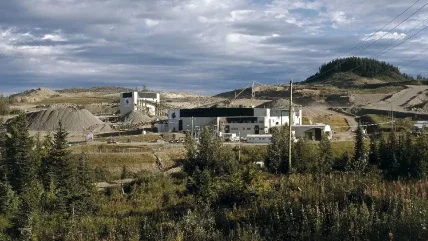
Disciplinary proceedings have been carried out against three current and former engineers in relation to their work at the Mount Polley Mine in British Columbia, Canada, Engineers and Geoscientists British Columbia has announced.
The regulatory and licensing body for the engineering and geoscience professions in BC recently concluded its multi-year investigations that were initiated following the breach of the mine’s tailings storage facility on 4 August 2014.
Engineers and Geoscientists BC says it is responsible for establishing and upholding standards of professional practice and ethical conduct. If it determines that an engineer or geoscientist may have breached these standards, action is taken through a comprehensive investigation and discipline process.
The cases at Mount Polley are described as being some of the most complex investigations Engineers and Geoscientists BC has undertaken. During its investigations, the regulator reviewed thousands of documents including contracts, technical reports and drawings, correspondence, and daily site reports.
“This marks the final chapter in a long and difficult story for our province and our professions,” said Heidi Yang, CEO of Engineers and Geoscientists BC. “Over the past several years, our focus has been on delivering a comprehensive, rigorous, and fair process, and we’re pleased to be able to provide the public with these results. The conclusion of these cases, combined with resources we’ve developed to improve dam safety, will strengthen our professions’ and our province’s environmental safeguards.”
Following the breach, Engineers and Geoscientists BC took actions to improve dam safety in BC, which included producing professional practice guidelines for site characterisation of dam foundations in BC, updating existing guidelines to confirm the duties of the Engineer of Record, and holding professional development seminars. Engineers and Geoscientists BC is also currently updating its guidelines on legislated dam safety reviews.
Disciplinary
During the recent disciplinary proceedings, the regulator looked at the conduct of former engineer Todd Martin who was the senior geotechnical engineer responsible for the geotechnical engineering work at the Mount Polley Mine tailings storage facility (TSF).
Martin admitted to some of the allegations that aspects of his engineering work were not consistent with prudent engineering practice. He further admitted that he failed to make a record of important field observations in 2011, a matter which constitutes unprofessional conduct.
Martin ceased practising engineering in 2018 and resigned his engineering licence in January 2020. He is no longer permitted to practise professional engineering or geoscience in British Columbia.
Laura Fidel was found to have committed several acts of unprofessional conduct in relation to her engineering work. She failed to ensure sufficient observation and monitoring of the tailings dam while acting as Engineer of Record and demonstrated unprofessional conduct by sealing design drawings without undertaking sufficient review of the design which was not prepared by her.
Fidel’s registration as a professional engineer was suspended for a period of two months and she was ordered to complete three education courses relating to tailings management, tailings facility design and operation, and engineering management for mine geowaste facilities.
Former engineer Stephen Rice was found to have committed several acts of unprofessional conduct in relation to his engineering work at the facility. He failed to properly fulfil the role of review engineer, demonstrated unprofessional conduct by allowing a junior engineer who had little experience with embankment design to act as Engineer of Record for the project, failed to ensure sufficient observation and monitoring of the tailings dam, failed to document his review work, and failed to ensure an excavation left unfilled at the toe of the embankment was assessed to determine what impact it may have on the stability of the embankment.
Rice resigned his engineering licence in January 2018 and is no longer permitted to practise professional engineering in British Columbia.
Regulate
Engineers and Geoscientists BC has also recently been granted the authority to regulate engineering and geoscience firms – a new regulatory responsibility that will enhance its ability to protect the public and address standards of conduct and practice at the organisational level.
“The ability to regulate firms that provide engineering and geoscience services is an important regulatory tool that will enable us to improve public safety and confidence in the engineering and geoscience professions, ultimately resulting in stronger regulation and a safer British Columbia,” said Yang. “Our robust regulatory framework will enhance public protection by introducing established standards of practice for all firms engaging in professional engineering and geoscience, which will be enforced through regular audits to ensure compliance.”
The full text of the disciplinary results for Todd Martin, Laura Fidel and Stephen Rice can be found at egbc.ca/Discipline-Notices
Tailings failure
 Failure of the tailings storage facility at the Mount Polley Mine on 4 August 2014 led to the loss of about 17Mm3 of water and 8Mm3 of tailings and materials.
Failure of the tailings storage facility at the Mount Polley Mine on 4 August 2014 led to the loss of about 17Mm3 of water and 8Mm3 of tailings and materials.
On 30 January 2015, the Mount Polley Independent Expert Engineering Investigation and Review Panel delivered its final report on its investigation into the cause of incident.
The panel concluded that the breach was the result of a failure in the foundation of the embankment and that the design was a dominant contribution to the failure. The report also indicated that the failure was triggered by construction of the downstream rockfill zone at a steep slope. Had the downstream slope been flattened, failure would have been avoided. The slope was in the process of being flattened to meet its ultimate design criteria at the time of the accident.
The panel made seven recommendations to improve practice and reduce the potential for future failures. These included improving corporate governance, strengthening current regulatory operations and improving professional practice.






